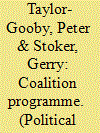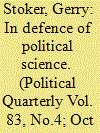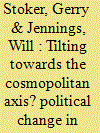| Srl | Item |
| 1 |
ID:
149218


|
|
|
|
|
| Summary/Abstract |
A dynamic of global economic development means that many countries are experiencing uneven development and their citizens are increasingly split between those who can access high-skill jobs and those who cannot. As a result some citizens are living in cosmopolitan areas of growth and others in backwater areas of decline. There are emerging out of these processes two versions of England. In cosmopolitan areas we find an England that is global in outlook, liberal and more plural in its sense of identity. In provincial backwaters we find an England that is inward-looking, relatively illiberal, negative about the EU and immigration, nostalgic and more English in its identity. This bifurcation of England is already having political effects, reflected in the outcome of the 2015 general election. It will further reconfigure politics over the next two decades, creating diverse political citizens and a complex array of challenges and dilemmas for governments, political parties, campaigners and political organisers.
|
|
|
|
|
|
|
|
|
|
|
|
|
|
|
|
| 2 |
ID:
103537


|
|
|
|
|
| Publication |
2011.
|
| Summary/Abstract |
The Coalition programme includes restructuring public provision through reforms and cuts which will take public spending in the Britain below that in the US. This article explores whether the Coalition agenda is best understood as a new approach to Britain's deep-seated economic short-comings or simply as the normal politics of gaining and retaining power. It analyses the current government's programme, identifies the common features across the range of policies and discusses how they are likely to develop as they encounter set-backs.
|
|
|
|
|
|
|
|
|
|
|
|
|
|
|
|
| 3 |
ID:
118217


|
|
|
|
|
| Publication |
2012.
|
| Summary/Abstract |
The defence of political science rests on a starting proposition that practitioners of political science need to embrace relevance rather than fear. Defending the role of politics in resolving societal dilemmas is in part a responsibility of those who study it and the challenge is significant given evidence of disenchantment with the political process in many established and mew democracies. Political science needs to offer not only an understanding of politics that is theoretical, sophisticated and empirically rigorous but also an approach that is not just problem-focused but solution-seeking. Defending political science means defending politics and taking on the challenge of improving its practice.
|
|
|
|
|
|
|
|
|
|
|
|
|
|
|
|
| 4 |
ID:
092398


|
|
|
|
|
| Publication |
2009.
|
| Summary/Abstract |
This paper reviews two contrasting approaches governments use to engage the citizen to promote better public policy outcomes: nudging citizens using the insights of behavioural economics, as summarised by Thaler and Sunstein (2009) or giving citizens the space to think through and debate solutions, as indicated by proponents of deliberative democracy. The paper summarises each approach, giving examples; then it compares and contrast them, illustrating their relative strengths and weaknesses. The paper concludes by suggesting that the approaches share some common features and policy-makers could useful draw upon both.
|
|
|
|
|
|
|
|
|
|
|
|
|
|
|
|
| 5 |
ID:
155403


|
|
|
|
|
| Summary/Abstract |
The general election of June 2017 revealed a continued tilting of the political axis in England that has been long in the making. This was not a Brexit ‘realignment’—in that the vote is better seen as a symptom of a longer-term divide that is emerging between citizens residing in locations strongly connected to global growth and those who are not. In this analysis, we explore constituency-level patterns of voting in England between 2005 and 2017. Over this period, Labour's vote share has tended to rise in urban areas (that is, major cities), with younger and more diverse and more educated populations often working in ‘cosmopolitan’ industries, whereas the Conservative vote has tended to increase in less densely populated towns and rural areas, with older and less diverse populations. Significantly, Labour has also increased its vote in constituencies with a higher share of ‘precariat’ and emerging service workers—somewhat at odds with characterisation of a party that has lost the ‘left behind’. To the extent that changes in electoral support for the Conservatives and Labour are linked to the Brexit vote, the relationship far predates the referendum vote and should be expected to continue to reshape British politics in future.
|
|
|
|
|
|
|
|
|
|
|
|
|
|
|
|